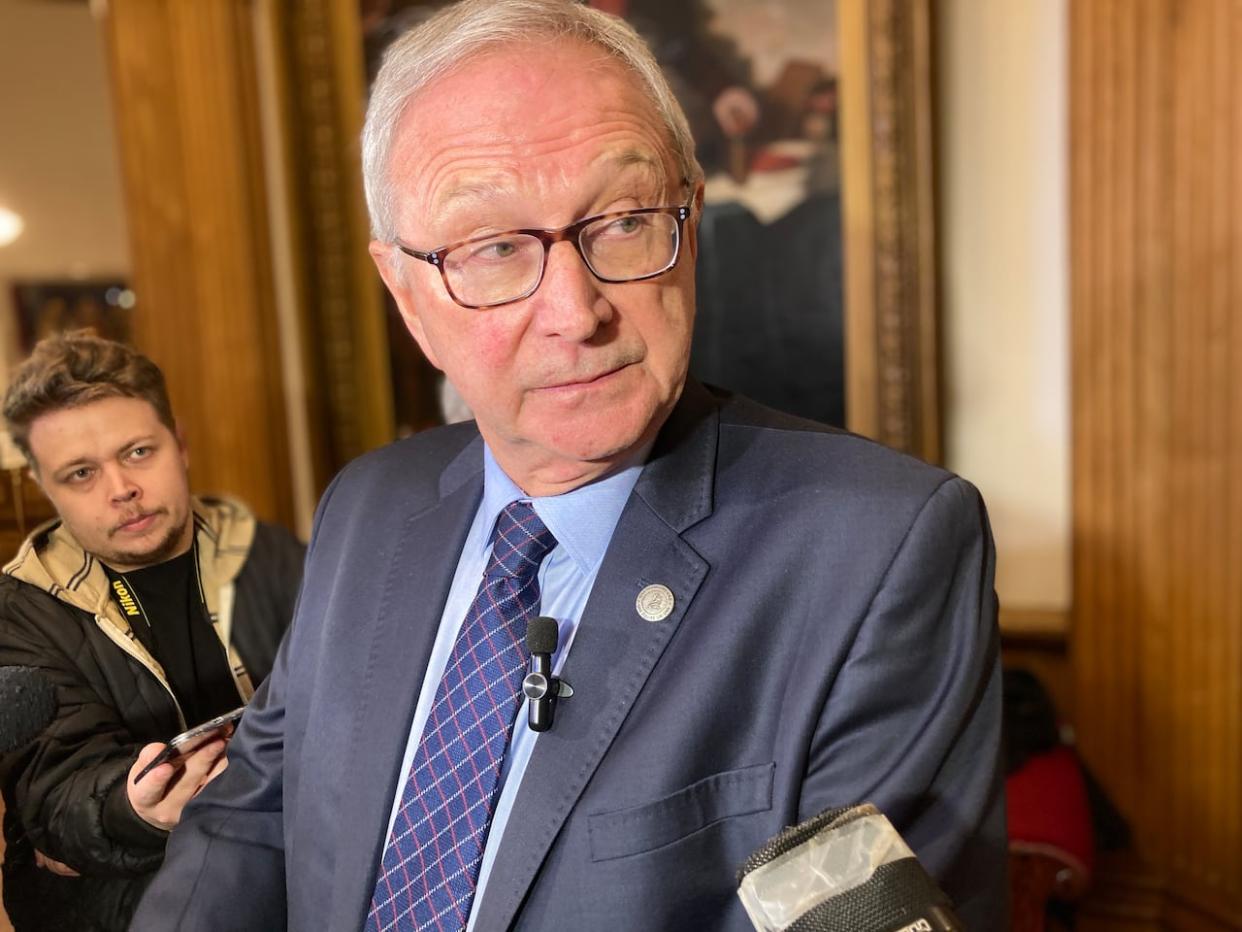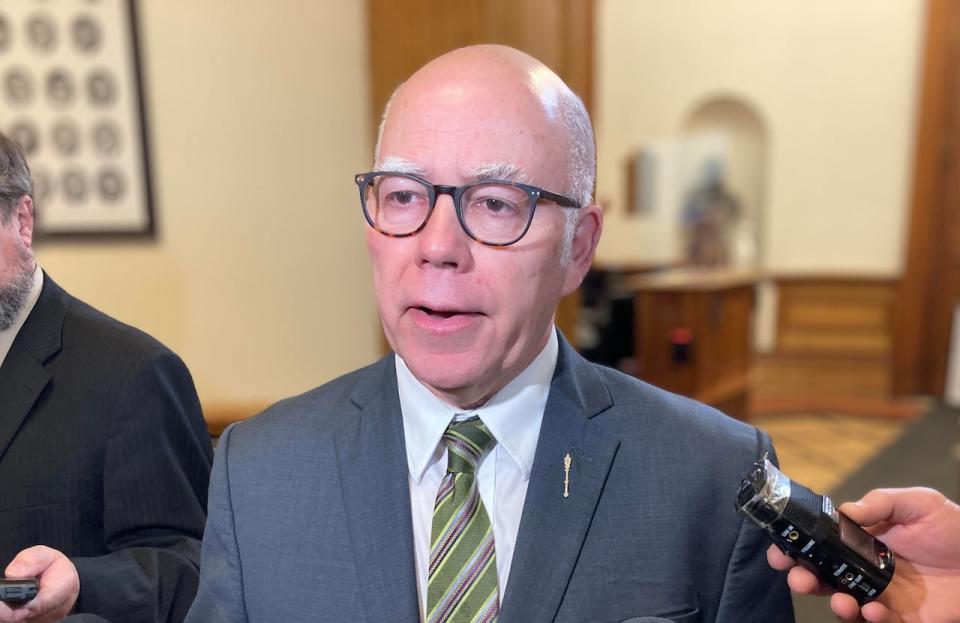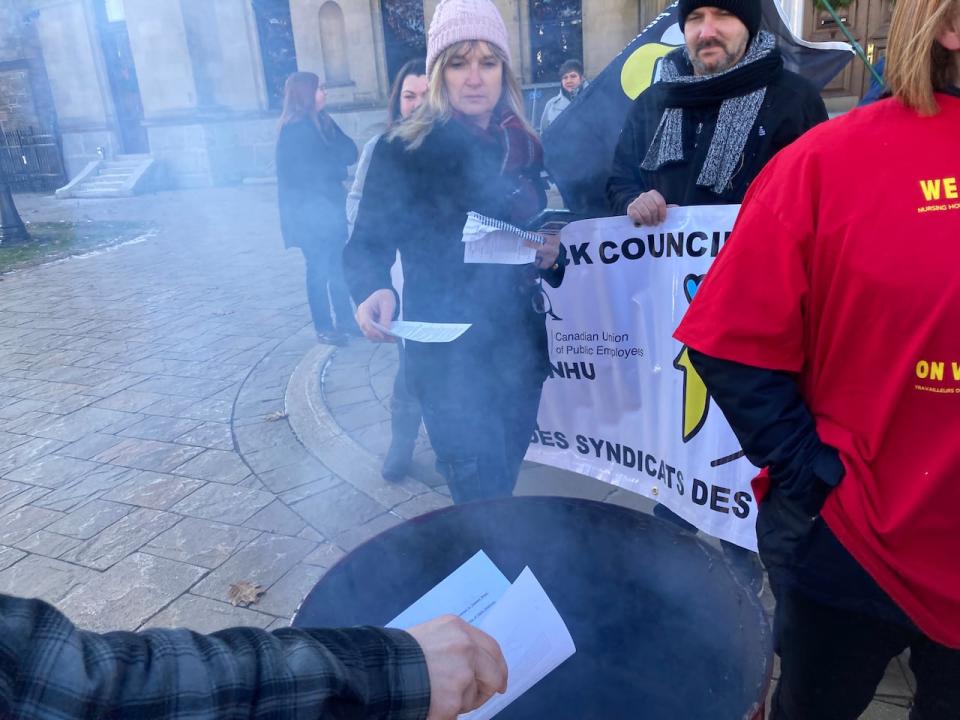PC majority puts another limit on pension bill debate

The Higgs government cut short debate on controversial pension legislation again Friday, putting another limit on top of the legislature's already restricted consideration of the bill.
The Progressive Conservative majority has already moved to cap discussion of the bill at 10 hours, a limit that will allow for swift final passage of the measure next Tuesday.
On Friday morning the Tories went one step further, voting to adjourn the legislature early for the weekend.
"This is consistent with the way the premier's been acting. He broke his word and the contract," Green Party Leader David Coon said.
"He is determined to go forward with his choice of pension plans no matter what, and he's decided to shut down the house to ensure he can do that."
Premier Blaine Higgs blamed the opposition Liberals and Greens for the decision to wrap up the day's sitting around 11:30 a.m. rather than the usual 2 p.m. Friday adjournment time.

Green Party Leader David Coon said the premier's moves to limit debate on the pension bill are breaking his word. (Jacques Poitras/CBC)
"Have you been listening to the level of debate over the last few days?" Higgs asked reporters.
"If you've been listening, what we would hear is a rerun of no real information sharing, or no real opportunity to discuss the actual details of the pension changes."
Earlier, the government asked for the required unanimous consent of all MLAs to wrap up second reading and send the bill to the committee stage for discussion until the 2 p.m. adjournment.
Opposition members refused, so the government moved to adjourn.
In the committee stage, Liberal and Green MLAs would have had the right to question cabinet ministers about the legislation rather than just give speeches.
Ministers in turn would be allowed to consult civil servants when providing answers.
Higgs said that would have been a more informed, substantial discussion.
"The staff were here, ready to go in and — I was going to participate in it is well — and share every piece of information, answer every question. But they don't want to do that," he said.
"I just can't believe that the opposition would turn down the opportunity to understand what it really means to employees. What are they debating about if they don't want to know the facts of what it means?"
At issue: Shared-risk pension plans
The Pension Plan Sustainability and Transfer Act would force two CUPE locals in the education sector and three groups in the New Brunswick Council of Nursing Home Unions into a process to determine the future of their pension plans.
It requires them to choose one of three different shared-risk pension plans and for the transition to begin by Feb. 1.

Some CUPE union members protested in front of the legislature in November against the plan to force five public-sector unions into a shared-risk pension plan. (Jacques Poitras/CBC)
The two CUPE locals, representing school custodians, maintenance workers, bus drivers and administrative staff, signed a side agreement on pensions with the province in 2021 at the end of a 16-day strike.
It set up a separate process to resolve the issue.
Last week, Higgs accused the union of dragging its feet and declared it was time to legislate a solution.
CUPE said the contract it signed in 2021 does not allow the province to do that, making the legislation a violation of the agreement and of collective bargaining rights.
Threat of illegal strikes
Union officials warned this weekend that some members could strike illegally in response to the bill, though so far there's been no sign of that.
On Thursday, education officials in the anglophone education sector sent a memo to school staff warning them they could be fired if they take any illegal job action, including "work-to-rule or unusual call-ins for sick leave."
Higgs acknowledged that work-to-rule, which means doing the minimum work required under a labour contract as a former of protest, might not actually be illegal.
"I guess it depends to what extent, how far it went," he said. "It says 'may constitute' an illegal strike, so we would ask for an interpretation of that."
Liberal leader Susan Holt said the memo was premature and will create unnecessary anxiety.
"It's a shame they have to send a letter like that because the premier can't negotiate in a fair way."
Friday's early adjournment means the debate on the bill is effectively over.
The motion capping debate at 10 hours will get a vote next Tuesday, but it will apply retroactively to the time already spent on the bill — and MLAs have already devoted more than 10 hours to it.
That means once the motion passes, MLAs will immediately vote on all remaining stages of the bill itself with no further discussion.
"This is it," Coon said. "It's done."


